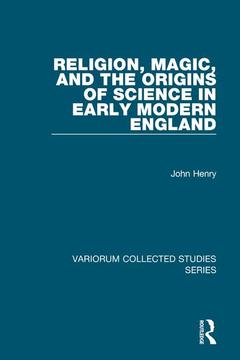Description
Religion, Magic, and the Origins of Science in Early Modern England
Variorum Collected Studies Series
Author: Henry John
Language: English
Subjects for Religion, Magic, and the Origins of Science in Early...:
Keywords
Knight Errant; Ashmole’s Theatrum Chemicum Britannicum; mechanical; Theological Voluntarism; philosophy; Seventeenth Century English Natural Philosophy; occult; Pierre De Maricourt; qualities; Occult Qualities; natural; Mechanical Philosophy; van; Natural Magic Tradition; helmont; Van Helmont; cambridge; Magnetic Dip; platonism; Cosmical Qualities; active; Magical Tradition; Enchiridion Metaphysicum; Magnetic Motions; Grand Point; De Magnete; De Anima Brutorum; Inanimate Brute Matter; Intellectualist Theology; English Natural Philosophers; Celestial Influences; Natural Magic; Hooke’s Contemporaries; Providential Theology; Natural Magician
Approximative price 177.01 €
In Print (Delivery period: 14 days).
Add to cartPublication date: 05-2012
· 17.4x24.6 cm · Hardback
Publication date: 05-2017
· 15.2x22.9 cm · Paperback
Description
/li>Contents
/li>Biography
/li>




